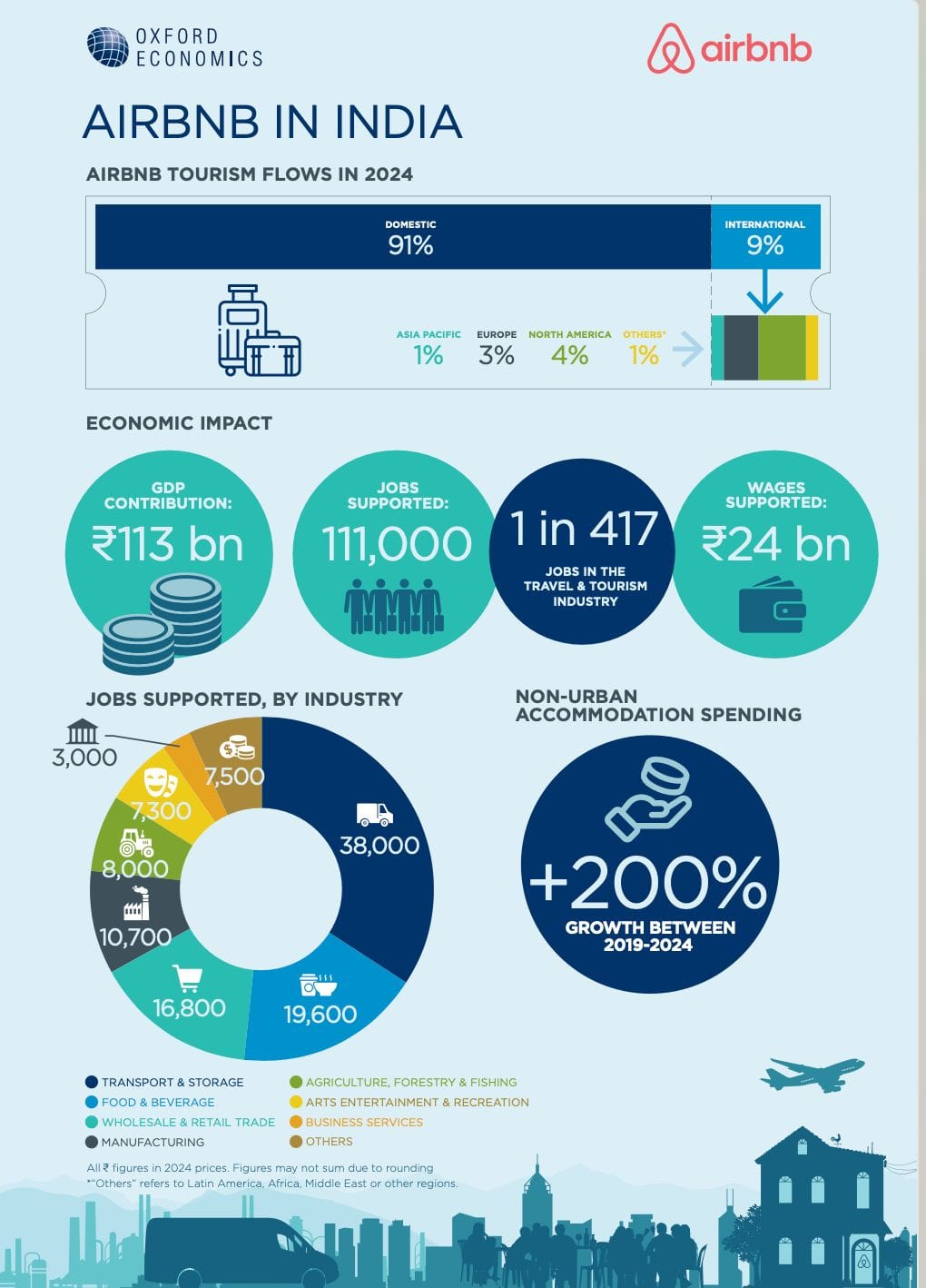Airbnb delivered INR 113 billion to India’s GDP

New research¹ by Oxford Economics, commissioned by Airbnb, shows that the platform made a significant contribution to India’s economy in 2024. Airbnb activity contributed INR 113 billion to India’s economy in 2024. Economic activity from Airbnb also helped support 111,000 jobs while contributing INR 24 billion in wage income.
The report shows that in 2024, domestic travellers comprised around 91% of Airbnb guests in India, a notable rise from approximately 79% in 2019. This was fuelled by a surge in domestic travel, corresponding to stronger demand from younger Indian Airbnb guests, and positioned India as one of Airbnb’s fastest growing markets. Among international guests, the largest inbound sources were the United States, United Kingdom, Canada and Australia¹.
In 2024, Airbnb guest spending in India reached INR 112 billion, which includes both accommodation and non‑accommodation expenses. Guests stayed an average of two nights in India and spent INR 11,000 daily on non‑accommodation essentials — like dining, retail stores and transport. Of every INR 10,000 spent in-destination, INR 3,800 was spent on restaurants; INR 2,400 on transport, INR 2,100 on shopping, INR 900 on arts and entertainment, and INR 800 on groceries.
Host earnings can also fuel local economies: income from hosting supports property upkeep, domestic services, and personal consumption—all helping to sustain local businesses and trades.
Airbnb’s footprint accounted for 0.5% of India’s travel and tourism GDP in 2024, and supported 0.2% of tourism-related employment - equivalent to one in every 417 tourism-related jobs¹. Beyond front-line tourism sectors, Airbnb-generated activity injected significant value into the wider economy: contributing INR 31 billion in transport and storage, INR 15 billion in agriculture, INR 13 billion in real estate and INR 12 billion in manufacturing.
Airbnb-supported tourism helped support approximately 38,000 jobs in transport and storage, 19,600 in food and beverage services, 16,800 in wholesale and retail trade, and 10,700 in manufacturing. These roles translated into tangible wage benefits, with Airbnb activity contributing around INR 8.1 billion in transport and storage wages, INR 2.9 billion in manufacturing wages, and INR 2.6 billion in real estate sector wages - highlighting a broad and meaningful economic uplift across communities.
Tourism in India is increasingly spreading beyond major cities. While the non-urban share of gross booking value (GBV) was 16.0% in 2024, the total non-urban GBV tripled since 2019, demonstrating growing traveller interest in rural and lesser-known destinations, outside of India’s major cities.
“India’s tourism sector is driven by strong demand amongst domestic travellers. From bustling urban cities to tranquil small towns, Indian travellers are exploring the richness and diversity of their own country. At the same time, this robust domestic tourism market points to an untapped potential for growth in the international tourism segment. Capturing that potential requires strategic partnerships with international platforms to boost inbound tourism and broaden India’s global appeal.
“Airbnb is playing an important role in India’s tourism market by broadening access to travel and dispersing its benefits more widely across the country. By connecting travellers with unique stays in lesser-known destinations, the platform is helping drive tourism demand across local communities in India. This leads to an expansion in economic opportunities, supporting livelihoods and sustaining small enterprises far beyond the major cities,” said James Lambert, Director of Economic Consulting Asia for Oxford Economics.
“Travel today is transformative, and we’re delighted to see Airbnb contributing meaningfully to India’s economy through our vibrant network of hosts and guests,” said Amanpreet Bajaj, Country Head – Airbnb India and Southeast Asia. “This report shows how domestic travel continues to be the primary engine of tourism in India fueling micro entrepreneurship, boosting allied sectors, and supporting small businesses across both emerging and lesser-known destinations. This momentum signals a broader shift toward more inclusive, locally driven tourism, and we are committed to supporting long-term, sustainable growth in partnership with governments and communities.”




